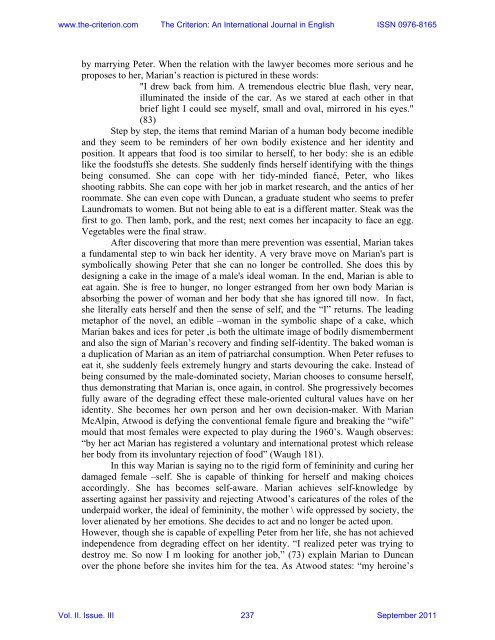Vol. II. Issue. III September 2011 - The Criterion: An International ...
Vol. II. Issue. III September 2011 - The Criterion: An International ...
Vol. II. Issue. III September 2011 - The Criterion: An International ...
Create successful ePaper yourself
Turn your PDF publications into a flip-book with our unique Google optimized e-Paper software.
www.the-criterion.com <strong>The</strong> <strong>Criterion</strong>: <strong>An</strong> <strong>International</strong> Journal in English ISSN 0976-8165<br />
by marrying Peter. When the relation with the lawyer becomes more serious and he<br />
proposes to her, Marian’s reaction is pictured in these words:<br />
"I drew back from him. A tremendous electric blue flash, very near,<br />
illuminated the inside of the car. As we stared at each other in that<br />
brief light I could see myself, small and oval, mirrored in his eyes."<br />
(83)<br />
Step by step, the items that remind Marian of a human body become inedible<br />
and they seem to be reminders of her own bodily existence and her identity and<br />
position. It appears that food is too similar to herself, to her body: she is an edible<br />
like the foodstuffs she detests. She suddenly finds herself identifying with the things<br />
being consumed. She can cope with her tidy-minded fiancé, Peter, who likes<br />
shooting rabbits. She can cope with her job in market research, and the antics of her<br />
roommate. She can even cope with Duncan, a graduate student who seems to prefer<br />
Laundromats to women. But not being able to eat is a different matter. Steak was the<br />
first to go. <strong>The</strong>n lamb, pork, and the rest; next comes her incapacity to face an egg.<br />
Vegetables were the final straw.<br />
After discovering that more than mere prevention was essential, Marian takes<br />
a fundamental step to win back her identity. A very brave move on Marian's part is<br />
symbolically showing Peter that she can no longer be controlled. She does this by<br />
designing a cake in the image of a male's ideal woman. In the end, Marian is able to<br />
eat again. She is free to hunger, no longer estranged from her own body Marian is<br />
absorbing the power of woman and her body that she has ignored till now. In fact,<br />
she literally eats herself and then the sense of self, and the “I” returns. <strong>The</strong> leading<br />
metaphor of the novel, an edible –woman in the symbolic shape of a cake, which<br />
Marian bakes and ices for peter ,is both the ultimate image of bodily dismemberment<br />
and also the sign of Marian’s recovery and finding self-identity. <strong>The</strong> baked woman is<br />
a duplication of Marian as an item of patriarchal consumption. When Peter refuses to<br />
eat it, she suddenly feels extremely hungry and starts devouring the cake. Instead of<br />
being consumed by the male-dominated society, Marian chooses to consume herself,<br />
thus demonstrating that Marian is, once again, in control. She progressively becomes<br />
fully aware of the degrading effect these male-oriented cultural values have on her<br />
identity. She becomes her own person and her own decision-maker. With Marian<br />
McAlpin, Atwood is defying the conventional female figure and breaking the “wife”<br />
mould that most females were expected to play during the 1960’s. Waugh observes:<br />
“by her act Marian has registered a voluntary and international protest which release<br />
her body from its involuntary rejection of food” (Waugh 181).<br />
In this way Marian is saying no to the rigid form of femininity and curing her<br />
damaged female –self. She is capable of thinking for herself and making choices<br />
accordingly. She has becomes self-aware. Marian achieves self-knowledge by<br />
asserting against her passivity and rejecting Atwood’s caricatures of the roles of the<br />
underpaid worker, the ideal of femininity, the mother \ wife oppressed by society, the<br />
lover alienated by her emotions. She decides to act and no longer be acted upon.<br />
However, though she is capable of expelling Peter from her life, she has not achieved<br />
independence from degrading effect on her identity. “I realized peter was trying to<br />
destroy me. So now I m looking for another job,” (73) explain Marian to Duncan<br />
over the phone before she invites him for the tea. As Atwood states: “my heroine’s<br />
<strong>Vol</strong>. <strong>II</strong>. <strong>Issue</strong>. <strong>II</strong>I 237 <strong>September</strong> <strong>2011</strong>
















